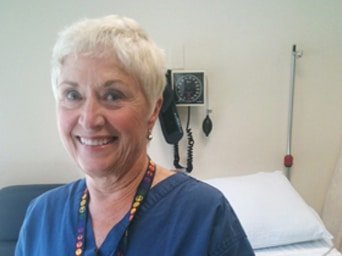
Edie Meeks, RN, seems very positive on first impression. But, she says the sadness and anger that resulted from her service as a combat nurse in Vietnam has never left her.
“It’s a deep sadness that cuts to the bone,” said Meeks. After decades of full-time nursing, Meeks now works two days a week as an Operating Room nurse at Northern Westchester Hospital in Mt. Kisco, New York.
Even with therapy for what she has long known is PTSD, the pain is, “more on the surface at some times than at others, but it never really goes away,” she said. “The Army wasted the lives of brave men who died for nothing,” she said, talking about soldiers who died of meningitis diagnosed too late, even before they left basic training. “Then, there were so many lives lost,” she said. “People back home were angry at the wrong people, at us, the soldiers, and not at the politicians who made the decisions.”
After discharge she was always quietly angry. She sometimes found it difficult to care for some of the patients at the local community hospital where she worked. Their problems seemed “like nothing.” She compared her patients at home with the injured soldiers she had treated in Vietnam and she struggled, having to remind herself to give excellent care to all.
For very many years, Meeks found it difficult to talk about her feelings. The first time she opened up was when a professor of her daughter’s at Mt. Holyoke College remarked that “women will never know what it is to be at war.” Reacting to that statement, Meeks’ daughter asked her to come to speak to the all-female class on the War in Vietnam.
Meeks told the group about her 12hr/6day-a-week tour of duty. She spoke of the heroic surgeries, the intensive care, and the evacuations of the wounded. At the time, she had two brothers- one in the Marine Corps and one waiting to be drafted. “Every one of those boys was my brother. I knew how special and important each soldier was to their families and loved ones. I had to be the best.” But she could not “save” them all and that ate at her for years. Then there was a moment at the end of the class that she will never forget. “One student came up to me and said, ‘I would have welcomed you home.’ For the first time I felt welcomed. My generation couldn’t do it, so maybe it was the next who would welcome and validate,” said Meeks.
It was years before Meeks spoke publically or even privately about Vietnam. For 20 years after Vietnam, she and her hoochmate Diane Carlson Evans, founder and president of the Vietnam Women’s Memorial Foundation Board, spoke of everything else, but not Vietnam.
Then in early 2000, invited to make remarks at a Vietnam-related ceremony at the Smithsonian, Meeks found herself faltering when she heard the ptt, ptt of the rotor blades of a Huey helicopter that was flying overhead as part of the program. “It was like being there,” she said. Although she regained her composure enough to give the speech, Meeks said, “I knew then that I really had to go for help and have been getting the treatment I need for PTSD at VA since.”
ATTENTION READERS
We See The World From All Sides and Want YOU To Be Fully InformedIn fact, intentional disinformation is a disgraceful scourge in media today. So to assuage any possible errant incorrect information posted herein, we strongly encourage you to seek corroboration from other non-VT sources before forming an educated opinion.
About VT - Policies & Disclosures - Comment Policy



